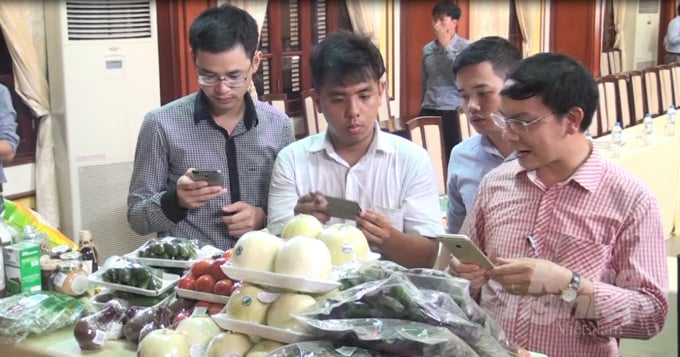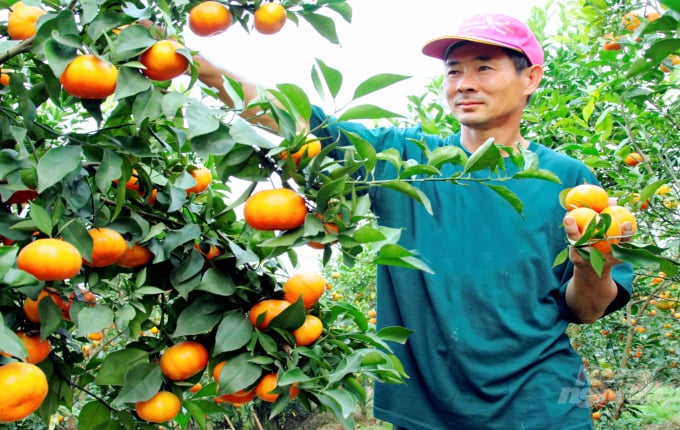November 28, 2025 | 06:42 GMT +7
November 28, 2025 | 06:42 GMT +7
Hotline: 0913.378.918
November 28, 2025 | 06:42 GMT +7
Hotline: 0913.378.918

Checking the origin of agricultural products by smartphone. Photo: TL.
The Department of Agriculture and Rural Area in Hanoi cooperated with Integrated Development Environment (IDE) to provide solutions and patent software namely "Authentification process for anti-counterfeiting" using CheckVN technology.
Up to now, this tracing system has supported, guided, and granted accounts to participate in the management and maintenance of the management system for nearly 3,000 agriculture establishments including cooperatives, processing, and preliminary processing as well as packing; 766 fruit shops have been issued with safe identification plates.
The system also helps complete the management process and transparentize information for 653 enterprises in Hanoi, 238 businesses in 35 other provinces and cities with 8,702 sets of traceability codes.
Thanks to the system, 80% of products from 141 production chains get QR Code for origin - tracing stamps when being circulated in the market while 80.5% of fruit shops downtown have used QR Codes for traceability.
This system is also being expanded to chain stores of agricultural products and foods, key growing areas of the city, and localities that have a link to Hanoi in terms of safe production and consumption.

Canh orange, a specialty of the city. Hanoi. Photo: TL.
Some districts namely Chuong My, Dong Anh, Me Linh, Phuc Tho, and Ba Vi among others are actively cooperating with relevant parties to set up proper plans to integrate into the city’s general system.
In addition to self-production, Hanoi needs to import a large number of agricultural products from other provinces and cities. Currently, products of 35 provinces and cities, of which 18 out of 21 provinces and cities in the North included in the Coordination Committee for the supply of vegetables and meat chains for Hanoi city have participated in the “Agro-Forestry -Fishery and Food Traceability System in Hanoi.”
Thanh Ha lychee of Hai Duong province, vegetables, and fruits of Vinh Phuc province, Cao Phong orange of Hoa Binh province, Hai Hau fragrant rice of Nam Dinh province are also stamped with tracking code. The provinces of Hoa Binh, Hung Yen, Quang Ninh have also applied the CheckVN solution to build an electronic information system to trace the origin of its agricultural products.
In 2019, the Hanoi Department of Agriculture and Rural Development piloted five establishments participating in the origin tracing system to apply software in managing the circulation of products. Up to now, many businesses in the city are successfully applying this set of solutions in administration, management, and market research such as Branch of CP Vietnam-NM Livestock Joint Stock Company Processing Hanoi meat products, Nui Be Grapefruit Cooperative (Chuong My District, Hanoi), Tam Xa Organic Agriculture Cooperative, Tien Duong Organic Agriculture Cooperative (Dong Anh District, Hanoi) among others.
Besides the initial success, there are still some difficulties. The system of law and documents on the instruction of providing essential information and knowledge about origin tracing is not completed. The improvement in social recognition has yet to meet the requirements.
The communication on agroforestry - fishery and food traceability system and QR Code struggles as businesses and establishments have yet to recognize the benefits and effectiveness of the tool.
The application of information technology in management, production, and business activities of enterprises and consumers is initially being implemented, but awareness is still limited.
A large number of agro-forestry-fishery products sold at traditional markets and businesses among others are purchased from business households at wholesale markets, however, the wholesale market management board is still limited in inspecting, monitoring food safety compliance. In addition, business households at the market are not interested in keeping invoices and documents to prove the origin of their products...

(VAN) According to Mr. Vo Minh Thanh, Director of the Tay Ninh Department of Agriculture and Environment, Resolution 57 has created a new development pathway for the locality, shifting from traditional toward modern agriculture.
/2025/11/26/4909-2-154329_878.jpg)
(VAN) Pearl grouper farming in HDPE cages not only delivers economic efficiency but also contributes to protecting the environment, creating jobs, and promoting marine-based experiential tourism.

(VAN) The model of making a living under the forest canopy through the agroforestry system in Van Son commune, Bac Ninh province, is expected to generate an annual income of approximately VND 30 million/ha.

(VAN) Many enterprises in Can Tho are harnessing natural energy and reducing greenhouse gas emissions in their production processes, thereby contributing to the promotion of a sustainable green transition.
/2025/11/24/3536-2-112800_176.jpg)
(VAN) Dong Nai now has tens of thousands of hectares of forests certified for sustainable management, and this area will continue to be expanded in the coming period.

(VAN) Vinh Ha hamlet (Dai Xuyen commune, Hanoi) is shifting away from small-scale farming as households adopt bioscurity into their breeder chicken models.

(VAN) Heavy rains make aquatic species more vulnerable to disease. Proactive water management and high-tech systems help farmers prevent outbreaks and protect yields.